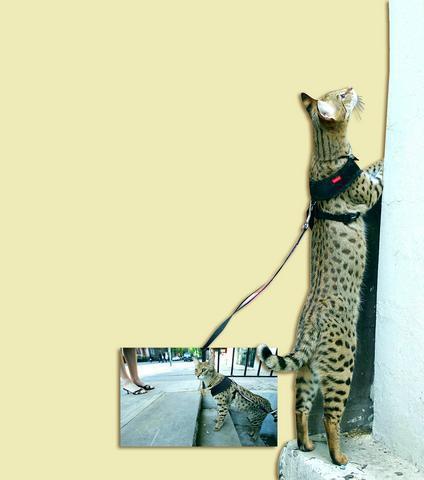Darjeerling and Bunnicula are two kittens who prefer shrimp cocktails and steak frites to pet food. They sleep on Burberry beds in their Greenwich Village apartment and wore matching crystal-studded collars until a few weeks ago, when they chewed off all the stones.
They live a life of luxury, to be sure, but it is life on the lam.
They are outlawed in New York City, members of a new designer breed growing in popularity called the Savannah, an offspring of a wildcat -- the African serval -- and the domestic house cat.

PHOTO: NY TIMES
"If I have to move to New Jersey to keep these cats, I will," said their owner, a 29-year-old hedge-fund analyst who equates life in downtown Manhattan with life itself. "That's how much I love them," she said, speaking only on the condition of anonymity.
The cats -- which can cost from US$4,000 to US$10,000 -- are visually striking with their long necks and oversized ears, and they can be intimidating. They look like little leopards and grow to more than twice the size of normal cats. They love to leap and splash in water, and they don't mind taking long walks on a leash. Some people describe them as dogs in cats' bodies.
"More than ever, everyone's been calling me about the Savannah, and I'm like, `What's going on?'" said Bash Dibra, an animal trainer in New York whose sessions, at US$300 to US$500 an hour, are often the last resort for people who cannot control their Savannahs.
Taking care of them on the sly -- as New Yorkers must -- can be tricky. Across the US, however, the Savannah is not always illegal: A hodgepodge of city and county regulations and state laws govern pets that are part wild.
HARD TO KEEP
In New York authorities do not scour the streets for such pets. Owners are often in hiding from their neighbors who might report them. For instance Darjeerling and Bunnicula rarely appear outdoors in the light of day. In an apartment on the Upper East Side, another Savannah named Tiger is tended by the household help in the middle of the night. And Kara LoDolce, who recently moved to a new town on Long Island with her Savannah, Mazi, will not even tell her friends where she lives.
"It's hard to have, hard to keep," said Dibra, who calls that part of the Savannah's appeal. It makes it "more mystical to own," he said.
New York City banned ownership of any wild or part-wild animals long ago. The state followed suit last year. Bethany Schumann, an aide to Assemblyman Paul Tonko, a Democrat from Amsterdam, who sponsored the state law, said her office had heard from hundreds of angry cat owners for and against the Savannah in the last couple of years.
"For whatever reason, these cats are cats many people would like to have," she said. "There is some sort of wow factor to the 35-pound cat (16kg) in your Manhattan
apartment."
But they come with too many unknowns, she added. "We have no idea what this cat's habitat should be," Ms Shumann said.
The cats are growing in popularity elsewhere in the country too. It is hard to estimate exactly how many Savannahs are kept as pets. Their numbers are surely small compared with the average cat. But animal trainers, veterinarians and pet-business owners say they are seeing the Savannah more frequently, while they were rare five years ago.
In Chicago, Cynthia King, a Savannah owner and breeder, said: "I had to wait two years to get my kittens, and I had cash I was waving in the air. For a first-generation pet, we're talking a US$5,000 minimum expenditure. That's how popular they are."
Julian Robertson, a breeder in Reidsville, North Carolina, said: "We've shipped them to Alaska, we've shipped them to Austria. You name it, and we've shipped them. We can't keep enough of them."
But owners are increasingly worried about restrictions. Chicago recently considered a wide-ranging ban on exotic pets. So far the proposed law has languished in a city council committee for more than a year, and its future is unclear. Massachusetts and Georgia, like New York, have strict bans against pets like the Savannah, while other states like Illinois and Arizona have restrictions but do not completely prohibit the animal. Some states require owners to obtain permits for part-wild pets. Others require nothing.
"We are one of the stricter states because we are one of the most densely populated states," said Thomas French, the assistant director of the Massachusetts division of fisheries and wildlife. "Any time you get a lot of people in close proximity to untrustworthy animals, it causes conflict. Sometimes the conflict is no more than a neighbor being frightened, but that is still conflict."
"We don't cater to people's fears," he said, "but we do try to regulate what we think is a public health threat."
WILD ANCESTRY
The first Savannahs were bred in the early 1980s, and named for the grasslands that are the natural habitat of their ancestor, the African serval. Female Savannahs cost up to US$10,000 because they can reproduce. The males sell anywhere from US$4,000 to US$8,000.
None of the authorities contacted could cite any dangerous incidents involving a Savannah. The same is not true for the African serval. Kim Haddad, a veterinarian and manager of the Captive Wild Animal Protection Coalition, a consortium of zoo professionals, sanctuary operators and animal rights groups in San Carlos, California, noted two serval attacks on children in the last four years.
The popularity of cat breeds rises and falls. The Savannahs are said to be gaining on the Bengal, a cross between the Asian leopard cat and a domestic cat, as the country's top exotic cat. "Bengals were the rage for a long time, but then people wanted something bigger," said Joyce Sroufe, a cat breeder in Ponca City, Okla., who was a pioneering force for the Savannahs. "People are really in awe of the way the kitty behaves, much like a dog."
Savannah owners form an odd sort of community, with most keeping a low profile while others are highly vocal about what they consider a tremendous wrong being inflicted on them simply for loving exotic pets.
Mazi's owner, LoDolce, is crusading against New York lawmakers, charging that the exotic pets law is unconstitutional in regard to Savannah cats. It allows an exception for hybrid pets that are five generations removed from wild blood. LoDolce and others argue that there is no scientific way to test a cat for such a thing, making the law unenforceable.
The law also allows owners to keep the illegal pets they already have, if they register the animals with the state. But even that option is rejected by many Savannah owners as a burden that is intrusive.
"There's a level of paranoia about these cats that's unbelievable," Ms LoDolce said.
PLAYING WITH NATURE
Another Savannah owner, Ronni Bennett, who lives in Greenwich Village, said that she does not approve of crossbreeds or wild hybrids, but that she wanted her cat anyway. "That is one of the contradictions of my life," she said. " I don't really approve of what I've done, but the beauty takes my breath away."
That's not the way New York State Senator Carl Marcellino of Syosset, sees it. Marcellino, the Senate sponsor of the state's exotic pet law, objects to the Savannah cat as something alien to the animal universe.
"Breeders are creating animals for commercial purposes that would never exist in the natural world," he said. "These hybrid species are threats to the environment and potentially to the families who think they are buying a family pet and could be purchasing a wild animal."
The Savannah cat has caused a stir about what makes an acceptable pet even among the largest and best known cat enthusiast groups.
"I'm told they're very loving, but I'm not sure I believe it," said Carol Barbee, the president of the American Cat Fanciers Association, which does not recognize the Savannah in its official registry. "We do not want to support designer breeds for the fad pet market."
Some Savannah owners are fighting for their rights with ammunition from another group, the International Cat Association, which does recognize the Savannah as a breed.
"They are the sweetest most gorgeous things you've ever seen," said Leslie Bowers, the association's business manager. Carolyn McDaniel, a consultant with the Cornell Feline Health Center, said that while Savannahs are popular across the country, she has noticed that they have become particularly alluring to city dwellers. "It's amazing to me that apartment dwellers are frequently the owners of these large semi-wild cats," she said.
"I think they're beautiful," McDaniel added, but "I'll watch them on the nature channel."

That US assistance was a model for Taiwan’s spectacular development success was early recognized by policymakers and analysts. In a report to the US Congress for the fiscal year 1962, former President John F. Kennedy noted Taiwan’s “rapid economic growth,” was “producing a substantial net gain in living.” Kennedy had a stake in Taiwan’s achievements and the US’ official development assistance (ODA) in general: In September 1961, his entreaty to make the 1960s a “decade of development,” and an accompanying proposal for dedicated legislation to this end, had been formalized by congressional passage of the Foreign Assistance Act. Two

President William Lai’s (賴清德) March 13 national security speech marked a turning point. He signaled that the government was finally getting serious about a whole-of-society approach to defending the nation. The presidential office summarized his speech succinctly: “President Lai introduced 17 major strategies to respond to five major national security and united front threats Taiwan now faces: China’s threat to national sovereignty, its threats from infiltration and espionage activities targeting Taiwan’s military, its threats aimed at obscuring the national identity of the people of Taiwan, its threats from united front infiltration into Taiwanese society through cross-strait exchanges, and its threats from

Despite the intense sunshine, we were hardly breaking a sweat as we cruised along the flat, dedicated bike lane, well protected from the heat by a canopy of trees. The electric assist on the bikes likely made a difference, too. Far removed from the bustle and noise of the Taichung traffic, we admired the serene rural scenery, making our way over rivers, alongside rice paddies and through pear orchards. Our route for the day covered two bike paths that connect in Fengyuan District (豐原) and are best done together. The Hou-Feng Bike Path (后豐鐵馬道) runs southward from Houli District (后里) while the

March 31 to April 6 On May 13, 1950, National Taiwan University Hospital otolaryngologist Su You-peng (蘇友鵬) was summoned to the director’s office. He thought someone had complained about him practicing the violin at night, but when he entered the room, he knew something was terribly wrong. He saw several burly men who appeared to be government secret agents, and three other resident doctors: internist Hsu Chiang (許強), dermatologist Hu Pao-chen (胡寶珍) and ophthalmologist Hu Hsin-lin (胡鑫麟). They were handcuffed, herded onto two jeeps and taken to the Secrecy Bureau (保密局) for questioning. Su was still in his doctor’s robes at